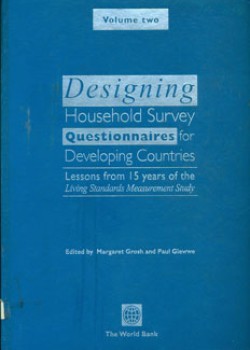
Designing Household Survey Questionnaires for Developing Countries
Lessons from 15 Years of the Living Standards Measurement Study - Volume 2
Editor: Grosh, Margaret and Glewwe, Paul.
Publisher: The World Bank (WB)
Place of Publish: USA, Washington D.C.
Year: 2000
Page Numbers: 389
Acc. No: 724
Class No: 001.42 DES
Category: Books & Reports
Subjects: Research Methods
Type of Resource: Monograph
Languages: English
ISBN: 0-19-521595-8
Household surveys are essential for the analysis of most policy issues. This book has carefully assessed recentexperience and developed today’s best-practice technique for household surveys. Indeed,much of this techniquewas developed and pioneered by the authors.This book is clear, systematic, and well structured. It is also wise andscholarly. It will be indispensable to anyone involved in carrying out or analysing household surveys, and thus, itis required reading for all those who wish to take evidence seriously, when they think about policy. The objective of this book is to provide detailed advice on how to design multi-topic household surveys based on the experience of past household surveys. The book will help identify and define objectives, identify data needed to analyse objectives and draft questionnaires to collect such data. Much of the book is based on the experience of the World Bank,s Living Standard,s Measurement Study (LSMS) programme, established in 1980, to explore ways the accuracy, timeliness, and policy relevance of household survey data collected in developing countries. It is part of an attempt to extend the range of policy issues that can be analysed with LSMS data, to increase the reliability and accuracy of the surveys and to make it easier to implement LSMS surveys. The book first discusses the "big picture" concerning the overall design of surveys, modules to be used, and procedures for combining modules into questionnaires and questionnaires into surveys. Individual modules are discussed in depth as well as major policy issues. The process of manipulating modules to form a better ,fit, in the case of a specific survey is examined. Specific modules include consumption, education, health employment, anthropometry, non-labour income, housing, price data, environmental issues, fertility, household income, savings, household enterprises and time use.



